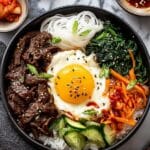Korean Beef Bibimbap Bowl Recipe
This Korean Beef Bibimbap Bowl is a vibrant and flavorful dish featuring seasoned ground beef, fresh sautéed vegetables, and a perfectly fried egg served over steamed short-grain rice. Enhanced with spicy gochujang sauce and sesame oil, it brings a balanced harmony of textures and bold Korean flavors to your table in about 50 minutes.
- Prep Time: 15 minutes
- Cook Time: 35 minutes
- Total Time: 50 minutes
- Yield: 4 servings 1x
- Category: Main Course
- Method: Stovetop
- Cuisine: Korean
Ingredients
Scale
Protein
- 1 lb lean ground beef
- 4 eggs
Grains
- 2 cups short-grain white rice (cooked)
Vegetables
- 1 cup carrots (julienned)
- 1 cup spinach (fresh)
- 1 cup zucchini (sliced)
- 1 cup bean sprouts
Sauces & Oils
- 3 tbsp gochujang sauce (adjust for spice level)
- 1 tbsp sesame oil
- 2 tbsp low-sodium soy sauce
Instructions
- Cook the Rice: Prepare the short-grain white rice according to the package instructions. Once cooked, set it aside, keeping it warm for assembling the bowls later.
- Brown the Ground Beef: Heat a skillet over medium-high heat and add the lean ground beef. Cook for 5-7 minutes, stirring occasionally, until fully browned. Drain any excess fat to keep the dish lean.
- Season the Beef: Stir in the gochujang sauce, low-sodium soy sauce, and sesame oil into the browned beef. Lower the heat to simmer and cook gently for 5 minutes, allowing the flavors to meld.
- Sauté the Vegetables: In the same or a separate skillet, heat some sesame oil over medium heat. Add the carrots, spinach, zucchini, and bean sprouts. Cook for about 7 minutes, stirring occasionally, until the vegetables are tender-crisp but still vibrant.
- Fry the Eggs: In a clean non-stick skillet, fry the eggs sunny-side up over medium heat. Cook until the egg whites are set but the yolks remain runny, approximately 3 minutes.
- Assemble the Bibimbap Bowls: To serve, divide the cooked rice among four bowls. Layer the simmered beef mixture over the rice, add the sautéed vegetables alongside, and top each bowl with a freshly fried egg. Drizzle additional gochujang sauce over the top if desired for extra heat and flavor.
Notes
- Adjust the amount of gochujang sauce according to your preferred spice level.
- Using lean ground beef keeps the dish healthier and less greasy.
- For a vegetarian version, substitute beef with seasoned tofu or mushrooms.
- Leftovers can be stored in the refrigerator for up to 3 days; reheat gently before serving.
- Serve with kimchi or pickled vegetables to add extra traditional Korean flavors.
Keywords: Korean beef bibimbap, bibimbap bowl, Korean rice bowl, ground beef recipe, gochujang sauce dish, Korean cuisine, healthy Korean dinner
Find it online: https://epicrecipebox.com/korean-beef-bibimbap-bowl-recipe/
